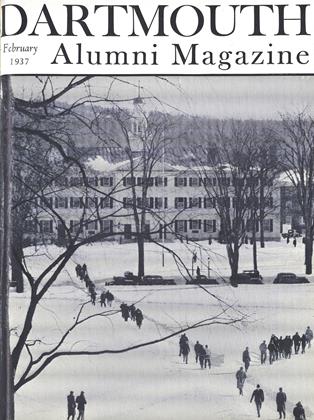Mid-year exams begin in a few days, and extra-curricular activities make a temporary halt and give way to the more immediate academic urge. The pause gives opportunity to reflect on the activities which take up so much time of the average Dartmouth undergraduate, whether having to do with athletics, the Outing Club, or any of the groups that center in Robinson Hall. The student organizations offer a curious paradox of business often conducted on an inefficient basis in defense of what amounts to a theory. That may be putting it a little strongly, but ignorance of it lies behind much of the criticism that is directed at campus organizations.
An example is the D. O. C., a club with rather indefinite objectives, which has built up a somewhat top-heavy administrative superstructure that probably could function more efficiently and smoothly without an undergraduate council attempting to maintain its initiative. The result has been an attempt at reorganization, and a general unrest which boils down to two groups, one visualizing a club furnishing cabins, trails, and equipment, enabling undergraduates to get as much as possible from its facilities, and in return demanding as little work as possible. The other group tends to feel that by undergraduate control something very valuable is gained, which more than compensates for any loss in efficiency. To be specific, cabin repairs could often be made better and perhaps cheaper by a professional carpenter, but under the present set-up work is done by undergraduates, who supposedly gain fellowship and group spirit from the project.
The same would hold true of The Dartmouth, where two or three efficient men could probably produce a better paper every 24 hours than can be produced by a group of essentially disorganized heelers. It narrows down to a question of whether the function of The Dartmouth is purely to produce a creditable news sheet, or to enable a certain group of undergraduates to gain valuable spirit and experience from the organization. The same holds true of other campus groups and college publications. Whether the "greater goal" is reached is another question. But it is well to remember when criticizing undergraduate activities, that the final purpose may be considerably beyond the immediate tangible result.
 View Full Issue
View Full Issue
More From This Issue
-
 Article
ArticleGradus Ad Parnassum
February 1937 -
 Class Notes
Class NotesClass of 1911
February 1937 By Nathaniel G. Burleigh -
 Class Notes
Class NotesClass of 1936
February 1937 By Rochard F. Treadway -
 Class Notes
Class NotesClass of 1929
February 1937 By F. William Andres -
 Article
ArticleThe Modern Museum
February 1937 -
 Class Notes
Class NotesClass of 1927
February 1937 By Doane Arnold
William B. Rotch ’37
-
 Letters to the Editor
Letters to the EditorWomen of Dartmouth
MAY 1997 -
 Article
ArticleWith the Outing Clubs
December 1936 By William B. Rotch ’37 -
 Class Notes
Class Notes1937
FEBRUARY 1963 By William B. Rotch ’37, FRANKLIN E. ROBIN -
 Class Notes
Class Notes1937
FEBRUARY 1964 By William B. Rotch ’37, FRANKLIN E. ROBIN -
 Class Notes
Class Notes1937
FEBRUARY 1966 By William B. Rotch ’37, FRANKLIN E. ROBIN, FRANCIS T. FENN JR. -
 Class Notes
Class Notes1937
JUNE 1965 By William B. Rotch ’37, JEROME H. LOW







